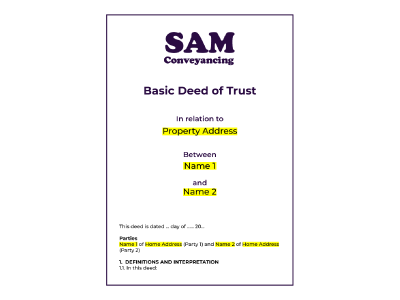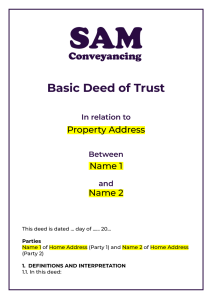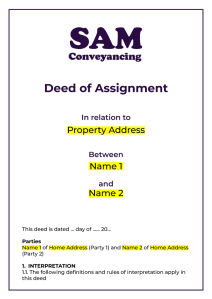What is a Deed of Trust on a Property?
A Deed of Trust is a legal document drafted by joint property owners in the UK. It sets out their intentions for the property and makes a declaration of trust stating their share of the beneficial interest. The technical term for this type of trust is an Express or Bare Trust.
For most people, a deed is used to protect money in a property so they get out what they put in. A Deed of Trust should include:
- A declaration of trust confirming the individual shares owned by the owners.
- How to sell the property.
- How to split the outgoings.
A 2022 Zoopla study found that over a quarter (27%) of separating homeowners experienced an unfair division of property sale proceeds, with most (72%) believing they received less than their fair share.
This is compounded by the fact that many (37%, rising to 46% for women) had no savings upon separation. Worryingly, only a small minority took preventative measures: 15% had a Deed of Trust and just 7% had a prenuptial agreement addressing property division in the event of a breakup.
What happens if you don't have a Deed of Trust?
If you don't have a deed and you're not married, you rely on the legal system to defend your position if there is a property dispute.
You'll be forced to instruct a property dispute solicitor to force a sale of the property and prove your beneficial ownership either through a resulting trust or a constructive trust.
These terms sound technical, meaning the legal costs for proving such a case can range from £3,000 to £40,000 or more.
When do you draft a Deed of Trust for a house?
A deed is most commonly drafted during the conveyancing process but can be drafted afterwards with the consent of all owners.
You should be careful using online DIY deeds as they do not come with legal advice from a solicitor to confirm they meet your intentions. DIY deeds can also be disputed and not fit for purpose. A solicitor-drafted deed should have the appropriate restrictions applied at the Land Registry.
Protect your interest in a property and confirm how to sell. Drafted by a solicitor.
The first draft is within 1 to 2 working days* and includes:
- Deposit paid.
- The percentage ownership of each party.
- How to share expenses like the mortgage and bills.
- Share of property income - rent or gain on sale.
- How to sell the property.
- How the property is divided in the event of separation, divorce, or death.
What are the Pros and Cons of a Deed of Trust?
- Protect what you invested in the property
- Agree terms on how to sell if one person doesn't want to
- Legally bind the owners to the clauses in the deed.
- Saves legal fees when going to court to force a sale.
- Avoid arguments over original property ownership intentions since it's recorded legally in a trust document.
- Fixed shares won't change if one of the owners stops paying the mortgage.
- Some standard deeds don't cover all eventualities.
- A deed can cause arguments in early-stage relationships - it's not very romantic focusing on the "what ifs"
- It is an additional cost at an already expensive time when buying a house.
- If you get married, the family court can overrule a deed if it's now considered an unfair division of assets.
What are the different types of trust deeds?
You can buy a standard deed with prescribed clauses or get a bespoke deed of trust. Here are a few different deeds to choose from:
Deed for buying a home
Any unmarried joint owners looking to declare their beneficial interest and confirm their intentions, such as how to sell the property or what happens if you break up. It normally states a fixed share of the beneficial interest; for example, Jane owns 40%, and Mike owns 60%.Deed for tax purposes
Husband and wife landlords sharing property income in a tax-efficient way with their partner (if married, to be filed alongside a Form 17 declaration to HMRC). If this is a property you already own as joint tenants, then we can help sever the joint tenancy.Floating shares deed
For unmarried couples wanting to reflect an accurate beneficial interest that goes up and down in line with their payments into the property, including mortgage repayments, costs of purchase/sale and developments.Deed of no beneficial interest
Used for clients buying with a joint mortgage sole proprietor mortgage product where they need to declare a zero beneficial interest to avoid second home stamp duty tax, divorces and even to protect joint shared but not jointly owned property.
What is a Deed of Trust for tenants in common?
If you're unmarried and buy a property with a partner, you'll likely register as tenants in common. That's where a Deed of Trust comes in, it'll protect your interests.
Can I use a deed when buying as joint tenants?
No. When buying as Joint Tenants, you can't own separate shares of the beneficial interest. To own separate shares, you need to:
- Sever the joint tenancy to tenants in common.
- Draft a Deed of Trust or Deed of Assignment depending on your marital status and the purpose of the deed; is it for tax on a second home or to define your interest due to a break-up?
Share rental income or transfer property ownership quickly and easily with a Deed of Assignment.
Get your first draft within 1-2 working days*.
Our experienced solicitors draft deeds for various purposes, from buy-to-let transfers to protecting your interest in the family home.
- Transfer rental income efficiently.
- Assign Capital Gains securely.
- Transfer full or partial ownership seamlessly.
Deed of Trust example
Scenario 1: Unmarried couples
This can apply to friends, colleagues, and partners who aren't married. Essentially, anyone buying property together.
Unmarried couples should never buy a property without a deed. The relationship can end as quickly as it started; however, the couple are still bound by the mortgage and the property. Unlike married couples who can rely on the divorce/family courts to work out what each is owed, unmarried couples don't have this.
Where a relationship breaks down for unmarried couples, a judge will put a huge weight on the Deed of Trust and question why it shouldn't be used to distribute the proceeds of the property or if there is a dispute over selling.
A floating Deed of Trust suits unmarried couples better because if they break up and one party moves out, the party remaining in the property paying more of the mortgage can increase their beneficial interest (equity) in the property until the sale.
Scenario 2: Married couples and civil partners
A Deed of Trust rarely suits married couples because of the family courts in a divorce. When you divorce, you declare all the joint assets and provide the deed.
While the judge reviews the deed, the decision on the split of assets is up to the judge, and the deed is often set aside when making that decision, especially if there are dependents or children.
Plus, even if there is a clause in the deed regarding sale, a judge won't decide on enforcing it whilst the divorce is being finalised.
If the deed is for tax purposes, then a Deed of Assignment might be more suitable.
Scenario 3: Family
Most commonly, a parent to a child where they support them buying their first home.
The risk of using a deed for the parents if they own another property is the stamp duty rules. By having an interest in another property and then also their child using a Deed of Trust, they will:
- Lose First-time buyer SDLT relief; and
- Attract second home SDLT rate on top of the normal rate of stamp duty.
The family may prefer a Loan Agreement over a Deed of Trust. If anyone is gifting money or planning to loan money to a family member, it's best to protect it and make it a legally-binding transaction.
Whether you're borrowing or lending money to purchase a property, our expert solicitors will help draft a bespoke loan agreement for you that is legally binding in England & Wales.
- Discussion and advice on your intentions.
- Suitable for loans to friends/family.
- Legally binding and enforceable in court.
- Sign, witness, and lend the money.
Lending
Borrowing
Caragh is an excellent writer and copy editor of books, news articles and editorials. She has written extensively for SAM for a variety of conveyancing, survey, property law and mortgage-related articles.
Andrew started his career in 2000 working within conveyancing solicitor firms and grew hands-on knowledge of a wide variety of conveyancing challenges and solutions. After helping in excess of 50,000 clients in his career, he uses all this experience within his article writing for SAM, mainstream media and his self published book How to Buy a House Without Killing Anyone.











